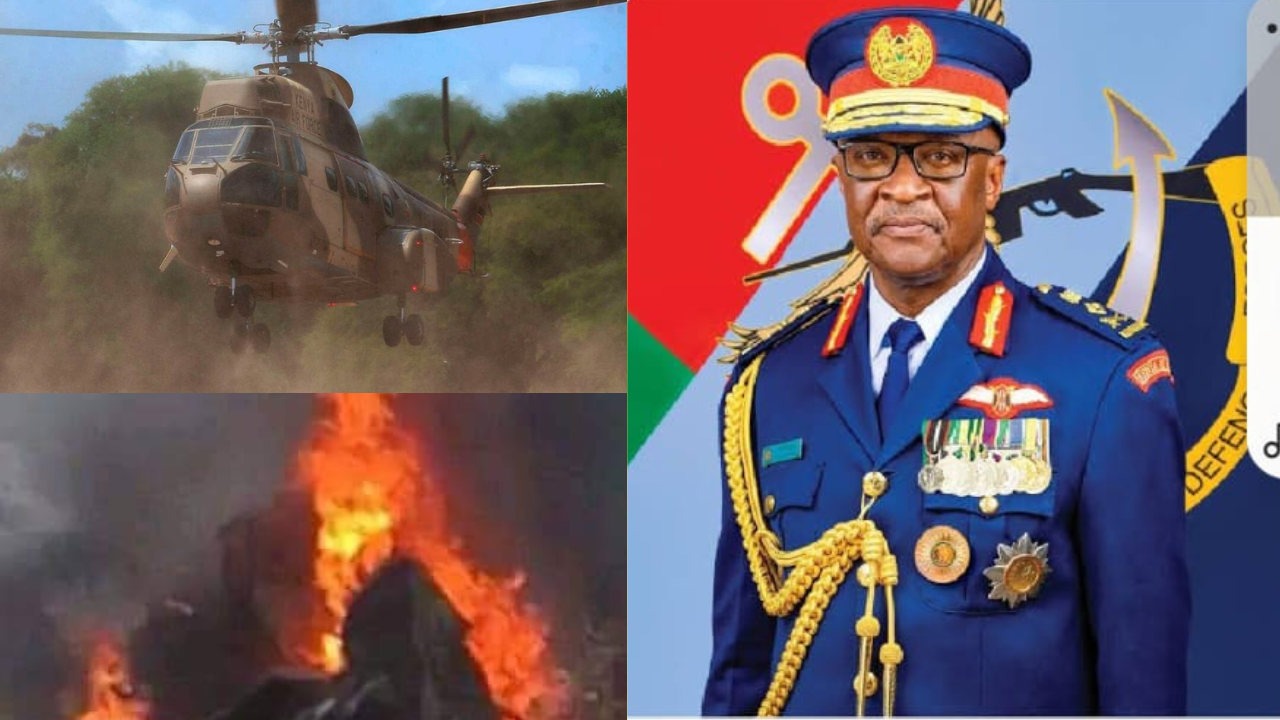In a chilling twist of fate—or perhaps by design—General Francis Omondi Ogolla of the Kenya Defence Forces met his untimely demise in a catastrophic helicopter crash. The tragic incident, which unfolded mere kilometers after takeoff at Chesegon area, on the border of Elgeyo Marakwet and West Pokot counties, bursting into infernal flames, claimed not only his life but also those of several other high-ranking military personnel. This grim event stirs the murky waters of political machinations, suggesting a dark undercurrent of conspiracy that may have been tailored to end the General’s life.
General Omondi Ogolla, appointed by President William Ruto in April 2023 amidst accusations of electoral interference, seemed an unlikely choice for his role given the political backdrop. Ruto had openly criticized General Ogolla for purportedly attempting to thwart his victory at the Bomas of Kenya during the contentious 2022 presidential election.
Despite this, or perhaps because of it, General Ogolla was thrust into a high-stakes position, steering the helm of the Kenya Defence Forces. It is essential to note that General Ogolla hailed from the Luo community, adding a layer of tribal tension to his appointment, given his perceived allegiance to Raila Odinga—Ruto’s main political rival also known as the enigma of Kenyan politics and the most prominent Luo in Kenya.
Fears of a Military Coup in Kenya?
In recent years, West Africa has become a hotspot for military coups, contributing to a climate of instability that resonates across the continent, including in Kenya. Notably, Mali witnessed two coups led by Colonel Assimi Goita, first in August 2020, overthrowing President Ibrahim Boubacar Keïta, and again in May 2021, ousting interim President Bah Ndaw.
In neighboring Burkina Faso, Captain Ibrahim Traoré took power in September 2022, toppling President Paul-Henri Sandaogo Damiba, who himself had led a coup earlier that January to depose President Roch Marc Christian Kaboré. Similarly, in Guinea, a coup in September 2021 saw Colonel Mamady Doumbouya remove President Alpha Condé from office.
These events illustrate a pattern of military interventions driven by dissatisfaction with governance and often justified as responses to corruption and ineffective leadership. This backdrop of military overthrows sets a nerve-wracking precedent, feeding into fears and suspicions within Kenya’s political landscape, where the echoes of such power shifts create an undercurrent of anticipation and wariness, magnifying concerns about the loyalty and intentions of military leaders amidst political tensions.
Fears that Ogolla might be too closely aligned with opposition forces—or worse, plotting a coup—could have seeded the motive for ensuring his premature exit from the political and military arena. His recent alleged switch to satellite-linked communication, ostensibly to evade surveillance by National Intelligence Services (NIS), only fueled these speculations, painting him as a figure maneuvering behind a veil of secrecy.
Flight Security of a Major General
For General Ogolla, a figure of paramount importance in the Kenya Defence Forces, the technical scrutiny of his helicopter transcends routine checks, aligning more closely with the meticulous protocols afforded to a head of state. Before the General boards, each helicopter must undergo a precise and detailed inspection, ensuring not a single screw is out of place. Critical components like the rotor and hub assembly, which commands the chopper’s thrust and lift, must be examined for any signs of wear or fatigue.
The engine, the heart of the aircraft, requires a thorough check to verify its perfect operation, focusing on fuel systems to prevent any possibility of malfunction that could lead to engine failure. Avionics systems, which navigate and communicate, are updated and tested to ensure that the most accurate and secure information flows unhindered between the chopper and ground control.
Additionally, the integrity of the helicopter’s hydraulic systems, responsible for controlling the moving parts essential for flight, is validated rigorously. Weather reports are scrutinized to chart a course away from potential turbulence, while real-time intelligence on ground situations is assessed to avoid any geopolitical or security threats.
This high standard of operational readiness illustrates a profound truth: for figures like General Ogolla, every flight is a mission critical to national security, leaving no room for error or oversight.
Deploying a General to Oversee Cattle-rustling Incidents?
One cannot help but marvel with incredulous suspicion at the peculiar circumstances surrounding General Ogolla’s tragic journey. It defies belief that a figure of his eminent stature, suited to strategize wars and command armies, was relegated to overseeing mere security concerns of cattle rustling incidents—a task seemingly beneath his lofty rank and typically reserved for police or the General Service Unit.
The deployment of such a high-ranking military official, along with an entourage of five senior officers, to a remote village in the Rift Valley for a function so rudimentary sparks a flurry of questions. This operational decision smacks of either gross misallocation of military resources or, perhaps more sinisterly, a calculated maneuver to place the General in a compromised situation.
Could this tragic flight have been a Machiavellian plot dressed in the garb of routine duty, aiming to remove a politically inconvenient commander under the guise of operational necessity? The entire scenario reads like a poorly scripted play, where the characters are unwittingly cast in roles leading to their doom, orchestrated by unseen puppeteers with agendas as dark as the night sky.
Could General Ogolla’s Elimination Have Been Pre-Meditated?
The enigmatic absence of General David Kipkemboi Keter, personal assistant to General Ogolla and his peer in rank, from the calamitous flight raises eyebrows and whispers of covert plots woven into the fabric of military protocol. Typically, high-ranking officers like General Ogolla would be shadowed by counterparts of similar stature, particularly under conditions ripe with potential threats.
The decision to instead surround him with officers of significantly lower rank—Col. Keitany, Capt. Sora, Sgt. Omondi, Capt. Litali, Sgt. Nyawira, and Lt. Col. Sawe—depicts an unusual break from standard security procedures. This aberration may suggest a chilling possibility: the deliberate isolation of Ogolla in a meticulously orchestrated tableau designed to ensure not merely his removal from a strategic post but his permanent extraction from the chessboard of military and political power.
One could conjecture that this was not mere misfortune but a premeditated act, cloaked in the semblance of a tragic accident, aiming to silence a potentially disruptive figure in a theatre shadowed by intrigue and power struggles.
Political Power Games and Maintaining the Status Quo
In the corridors of power, where loyalty and control are paramount, the survival of a military leader with substantial popular support and potential political leverage, especially one connected to opposition figures, might be seen as an intolerable risk. The alleged communications intercepted by American intelligence, hinting at a possible alliance with Odinga, add another layer of intrigue and perceived threat to the existing government.
Thus, weaving together the threads of tribal tensions, political rivalries, strategic communications, and a highly controlled military environment, a narrative emerges that General Ogolla’s death could very well be the result of meticulous planning aimed at removing a potential threat to the current regime.
This theory, while speculative, aligns with the patterns of political survival strategies observed globally, where the stakes are high, and the players are ruthless. In the grand chessboard of geopolitical power games, the crash may not have been an unfortunate accident but a calculated move to maintain the status quo and eliminate uncertainties.
Kenneth Ochieng
Kisumu City News




